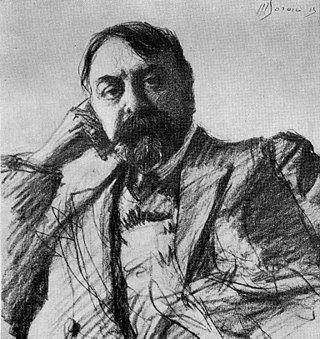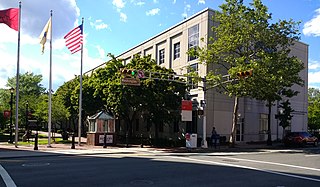Related Research Articles

Hegemony is the political, economic, and military predominance of one state over other states. Hegemony can be regional or global.
Grand strategy or high strategy is a state's strategy of how means can be used to advance and achieve national interests in the long-term. Issues of grand strategy typically include the choice of military doctrine, force structure and alliances, as well as economic relations, diplomatic behavior, and methods to extract or mobilize resources.

Louis Leo Snyder was an American scholar, who witnessed first hand the Nazi mass rallies held from 1923 on in Germany; and wrote about them from New York in his Hitlerism: The Iron Fist in Germany published in 1932 under the pseudonym Nordicus. Snyder predicted Adolf Hitler's rise to power, Nazi alliance with Benito Mussolini, and possibly the war upon the French and the Jews. His book was the first publication of the complete NSDAP National Socialist Program in the English language.

Rutgers University–Newark is one of three regional campuses of Rutgers University, a public land-grant research university consisting of four campuses in New Jersey. It is located in Newark. Rutgers, founded in 1766 in New Brunswick, is the eighth oldest college in the United States and a member of the Association of American Universities. In 1945, the state legislature voted to make Rutgers University, then a private liberal arts college, into the state university and the following year merged the school with the former University of Newark (1936–1946), which became the Rutgers–Newark campus. Rutgers also incorporated the College of South Jersey and South Jersey Law School, in Camden, as a constituent campus of the university and renamed it Rutgers–Camden in 1950.

In international relations theory, realism is one of the dominant schools of thought, theoretically formalizing the statesmanship of Realpolitik of early modern Europe. Although a highly diverse body of thought, realism is unified by the belief that world politics is always and necessarily a field of conflict among actors pursuing wealth and power. The theories of realism contrast with the cooperative ideals of liberalism in international relations.

Gilford John Ikenberry is a theorist of international relations and United States foreign policy, and the Albert G. Milbank Professor of Politics and International Affairs at Princeton University. He is known for his work on liberal International Relations theory, such as the books After Victory (2001) and Liberal Leviathan (2011). He has been described as "the world's leading scholar of the liberal international order."
Doug Stokes is a British academic who is Professor in International Security and Strategy in the Department of Politics at the University of Exeter. He was born in 1972 in Hackney, East London. His father was a gardener and sign writer and his mother was a cleaner and secretary. He was educated in London inner city state schools and left home at 17, and Hackney when 25.

Alexander John Motyl is an American historian, political scientist, poet, writer, translator and artist-painter. He is a resident of New York City. He is professor of political science at Rutgers University in Newark, New Jersey and a specialist on Ukraine, Russia, and the Soviet Union.

Richard Ned Lebow is an American political scientist best known for his work in international relations, political psychology, classics and philosophy of science. He is Professor of International Political Theory at the Department of War Studies, King's College London, Honorary Fellow of Pembroke College, University of Cambridge, and James O. Freedman Presidential Professor Emeritus at Dartmouth College. Lebow also writes fiction. He has published a novel and collection of short stories and has recently finished a second novel.

Henri Vaugeois was a French teacher and journalist who was one of the founders of right-wing nationalist Action Française movement.

Jean-Marc Coicaud is a French and American legal and political theorist focusing on global issues, among numerous other topics. He is Professor of Law and Global Affairs at Rutgers University and a Global Ethics Fellow at the Carnegie Council for Ethics in International Affairs. He is an elected member of the Academia Europaea. Over the years, he has lived and worked in Europe, the Americas, and Asia. His professional trajectory has combined serving as a policy practitioner at the national, regional, and global levels, and as a scholar and professor in academia.

Rutgers School of Public Affairs and Administration (SPAA) is the public administration school of Rutgers University, and is located on the Rutgers-Newark campus.

Stephen Gill, FRSC is Distinguished Research Professor of Political Science at York University, Toronto, Ontario, Canada. He is known for his work in International Relations and Global Political Economy and has published, among others, Power and Resistance in the New World Order, Power, Production and Social Reproduction, Gramsci, Historical Materialism and International Relations (1993), American Hegemony and the Trilateral Commission (1990) and The Global Political Economy: Perspectives, Problems and Policies.
Liberal institutionalism is a theory of international relations that holds that international cooperation between states is feasible and sustainable, and that such cooperation can reduce conflict and competition. Neoliberalism is a revised version of liberalism. Alongside neorealism, liberal institutionalism is one of the two most influential contemporary approaches to international relations.

Mark Galeotti is a British historian, lecturer and writer on transnational crime and Russian security affairs and director of the consultancy Mayak Intelligence. He is an honorary professor at the UCL School of Slavonic and East European Studies, a senior associate fellow at the Royal United Services Institute, and an associate fellow in Euro-Atlantic geopolitics at the Council on Geostrategy.
Barry S. Strauss is an American historian. He is a professor of history and humanistic studies at Cornell University, and a visiting Corliss Page Dean Fellow at the Hoover Institution.
Fen Osler Hampson is Chancellor's Professor at Carleton University and President of the World Refugee & Migration Council. He was a Distinguished Fellow and Director of Global Security Research at The Centre for International Governance Innovation. He is Co-Director of the Global Commission on Internet Governance. He was elected a Fellow of the Royal Society of Canada.

Marlène Laruelle is a French historian, sociologist, and political scientist specializing on Eurasia and Europe. She is Research Professor and Director of the Institute for European, Russian and Eurasian Studies (IERES) at the George Washington University (GW). Laruelle is also a Co-Director of PONARS, Director of GW’s Central Asia Program, and Director of GW's Illiberalism Studies Program. She received her Ph.D. in history at the National Institute of Oriental Languages and Cultures (INALCO) and spent time as a post-doc in the area of political science at Sciences Po in Paris. She is Senior Associate Scholar at the Institut français des relations internationales (IFRI). Her particular focus of interest is post-Soviet political, social and cultural developments, especially ideologies and nationalism. She is the daughter of the French philosopher François Laruelle.

Ariane Chebel d'Appollonia is a French-American ethicist, historian, and political scientist best known for her research on immigration and security studies. She is a professor at the School of Public Affairs and Administration (SPAA) and the Division of Global Affairs at Rutgers University - Newark.
Mervyn Frost is a South African and British political scientist.
References
- ↑ Reich, Simon; Lebow, Richard Ned (23 March 2014). Good-Bye Hegemony!. Princeton University Press. ISBN 9780691160429 . Retrieved 20 August 2017.
- 1 2 "Simon Reich Takes Reins at Global Affairs Division of Rutgers University in Newark". Rutgers University. 2008-08-11. Archived from the original on 2011-09-30.
- ↑ Markovits, Andrei S.; Reich, Simon (1 June 2001). The German Predicament: Memory and Power in the New Europe. Cornell Univ Pr. ISBN 0801480744.